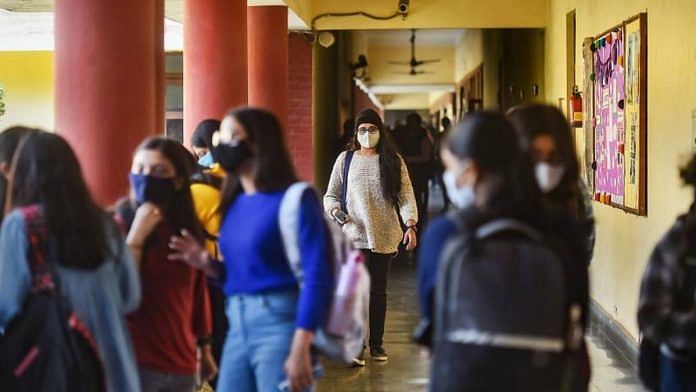New Delhi: The University Grants Commission (UGC) Wednesday released draft guidelines for higher education institutions (HEIs) focusing on addressing problems of students belonging to Socio–Economically Disadvantaged Groups (SEDGs).
The guidelines suggest initiatives such as bridge courses for students with learning deficiencies, earn-while-learn scheme, outreach programmes and setting up of an equal opportunity cell that colleges and universities will have to take to assimilate such students into the education system and reduce drop-outs.
The National Education Policy (NEP) 2020 identifies SEDGs as people from under-represented sections, socio-cultural identities (such as Scheduled Castes, Scheduled Tribes, Other Backward Classes, and minorities), geographical identities (such as students from villages, small towns, and aspirational districts), disabilities (including learning disabilities), socio-economic conditions and gender identities (such as women and transgenders).
It also includes people with “educational and economic backward identity (non-creamy layer among OBCs, economically weaker sections, students from vernacular medium schools, first generation learners”, etc.
Titled ‘Guidelines for Equitable Opportunity to the Socio-Economically Disadvantaged Groups in HEIs’, the draft proposes interventions to make such institutions more inclusive, equitable, and sensitive to SEDGs.
Among the UGC’s key proposals is the earn-while-learn scheme. It states that SEDG students be given the chance to work within the campus of higher education institutions for 20 hours a week, 20 days a month, and that they be paid on an hourly basis for part-time services which will be rendered after class hours.
Institutions will be further required to identify areas within the campus wherein such students can be given an opportunity to work and learn.
Promoting the scheme as beneficial, the draft reads: “On one hand, students are earning some extra money, while on the other, they are getting work experience and hands-on training while studying, something that needs to be encouraged in our education system.”
ThePrint reached out via messages to UGC chairman M. Jagadesh Kumar for a comment on the draft guidelines. The copy will be updated when a response is received.
Also Read: Student-centric NEP will change society, Karnataka education minister says as state unveils policy
Other affirmative actions
Additionally, HEIs were told to provide help to such students by giving them social and academic support through various initiatives, as well as conducting outreach programmes to help with language translation, recording services, and other assistive technologies.
Bridge courses are an example of affirmative action that HEIs can take. “Bridge courses are helpful, especially for newly admitted students, in the transition to studying in higher education institutions,” say the guidelines.
The objective behind offering bridge courses is “to help moderate and below-moderate-level students belonging to SEDGs bridge the gap between the subjects studied at the previous level and those to be examined at the entry level of the new academic programme”.
On the equal opportunity cell, the draft states that it will be tasked with protecting “the constitutionally guaranteed rights, dignity, safety, and security of all individuals belonging to the SEDGs”.
The unit will also be tasked with ensuring equal access and opportunities to students in order to pursue higher education with the help of the existing statutory bodies such as SC/ST and OBC cells.
“The equal opportunity cell shall function as a statutory umbrella body over the existing cells,” states the draft.
The guidelines also suggest that institutions have to ensure sensitisation of faculty, counsellors, and students about gender-identity issue and their inclusion in all aspects of the HEI. No-discrimination and anti-harassment rules will have to be strictly enforced as well.
(Edited by Nida Fatima Siddiqui)
Also Read: ‘Gruesome sexual content, Army in poor light’ — why DU removed 3 English texts from syllabus



